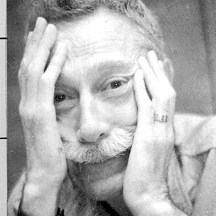CENTER FOR THE ART OF TRANSLATION: aron aji on bilge karasu
As part of the Center for the Art of Translation‘s Lit and Lunch series, Aron Aji talked about and read from his translation of Bilge Karasu’s A Long Day’s Evening at 111 Minna Gallery. — Tuesday, December 11th 2012
—
 In an introduction to his reading, Aji said A Long Day’s Evening was the book that was recommended to him to translate when he started translating in 1995, and he was “entirely overwhelmed, and… knew that in order to tackle this book” he “needed to read more of Karasu’s work.” So he translated the book Karasu wrote before and the book after this one “to understand what he was doing… and how his language evolved.”
In an introduction to his reading, Aji said A Long Day’s Evening was the book that was recommended to him to translate when he started translating in 1995, and he was “entirely overwhelmed, and… knew that in order to tackle this book” he “needed to read more of Karasu’s work.” So he translated the book Karasu wrote before and the book after this one “to understand what he was doing… and how his language evolved.”
He says Karasu was a master of “the new Turkish language… a deliberate national movement to develop a new literary sensibility, a new literary language. And Karasu is known as one of the second new wave—not the very first, which was overtly patriotic, because that was the project of the early republic, but it’s the second wave where in fact Karasu becomes extremely preoccupied with language, trying to create a language. … His project was not only to develop this new language, but also to develop the readership for this language.
 So these books are very mean books, in terms of reading. They are very difficult books to read, but they are also incredibly gratifying once one goes into them. The language takes shape before you. Karasu says, at one point, “The emergence of a literary text means that first its language has been made to express that text. Literature is the memory of language. I’m not saying the memory of individuals. It is the memory of language.”
So these books are very mean books, in terms of reading. They are very difficult books to read, but they are also incredibly gratifying once one goes into them. The language takes shape before you. Karasu says, at one point, “The emergence of a literary text means that first its language has been made to express that text. Literature is the memory of language. I’m not saying the memory of individuals. It is the memory of language.”
So it’s all about language taking shape inside the work. And, shaping its own readership. And you can now perhaps see why I had to read the preceding and the following books, in a way to sort of train myself to be the reader that he wanted. To become, if you will, through his writing.
The other thing that is worth keeping in mind is that he was a professor in philosophy. His specialty was semiotics, and he spoke six different languages and translated from about four of them. A year before he was dying of cancer he began learning Japanese. He was undaunted. And he has a very cosmopolitan upbringing: his father was Jewish, his mother was Greek Orthodox. And yet—and maybe because of this—he was able to really serve as a watershed moment in Turkish literature. And I say this quite boastfully in the very beginning of the preface: no book since this book has been written independent of this book. A Long Day’s Evening is the book that many many of his students who later became writers—when you meet them today when you say when did you decide to become a writer, they will always go back to this book A Long Day’s Evening. This is really the great seminal work, and unfortunately, the pun intended this time.
 Now, this is a very big challenge because … every country has a Dostoevsky, every country has a Marguerite Yourcenar. And so to say to you that if you want to know anything about Turkish literature beyond Orhan Pamuk, which I hope you do, this is a book you have to have or you have to read. I’m saying this as a person who holds a PhD in comp lit, where I was told I have to read certain books. And I unquestioningly read them. So go and do that. [laughs] But it’s that important in terms of modern and contemporary Turkish letters.
Now, this is a very big challenge because … every country has a Dostoevsky, every country has a Marguerite Yourcenar. And so to say to you that if you want to know anything about Turkish literature beyond Orhan Pamuk, which I hope you do, this is a book you have to have or you have to read. I’m saying this as a person who holds a PhD in comp lit, where I was told I have to read certain books. And I unquestioningly read them. So go and do that. [laughs] But it’s that important in terms of modern and contemporary Turkish letters.
The other thing is, he was so adamant about this project that one of the courses that he developed that now has become a standard curriculum in literature programs at the university level in Turkey… is a course on reading. It’s not, you know—we have writing courses; this is a course on reading. How to read. And it was the toughest course people report having taken from him.
Listen to the podcast of this entire program here.

